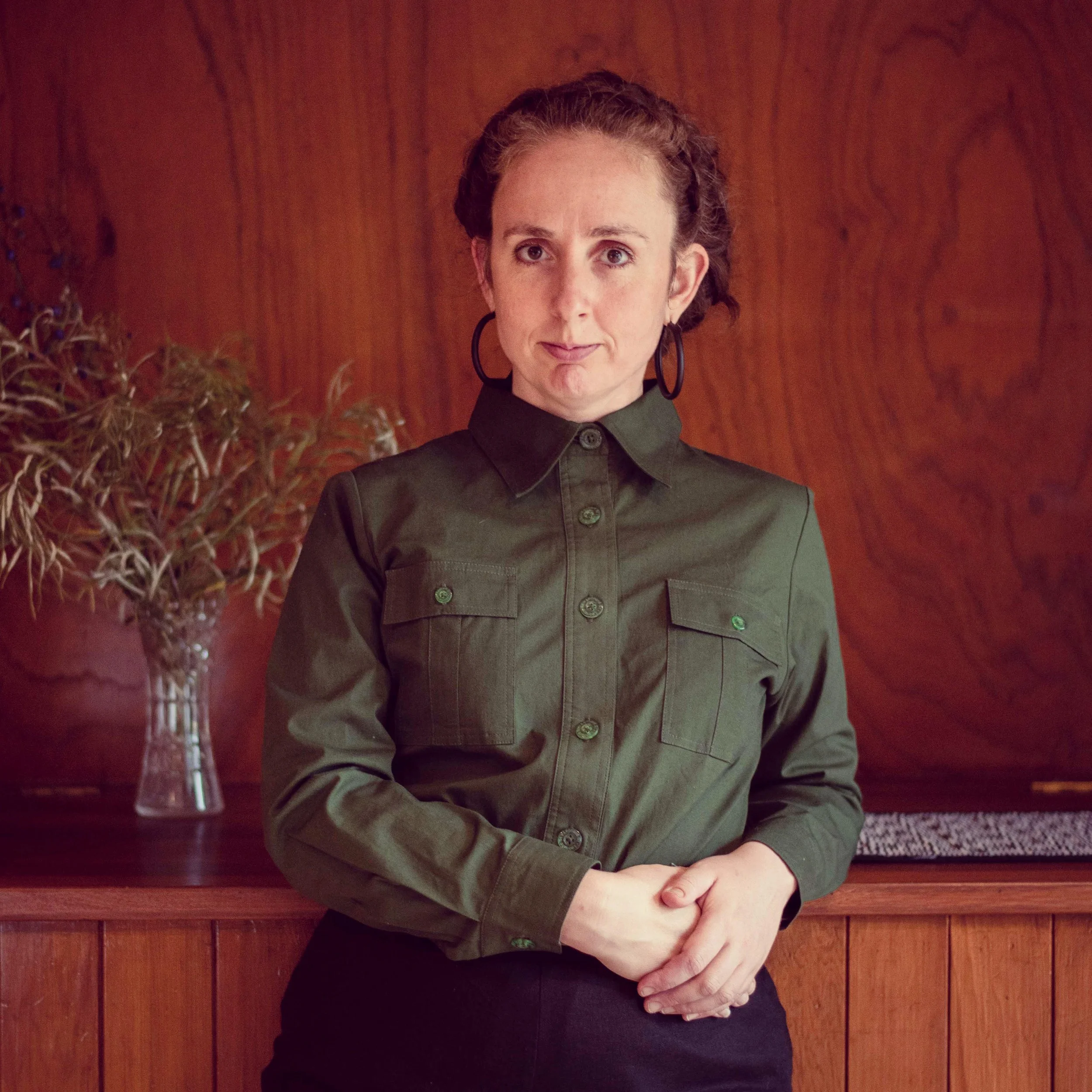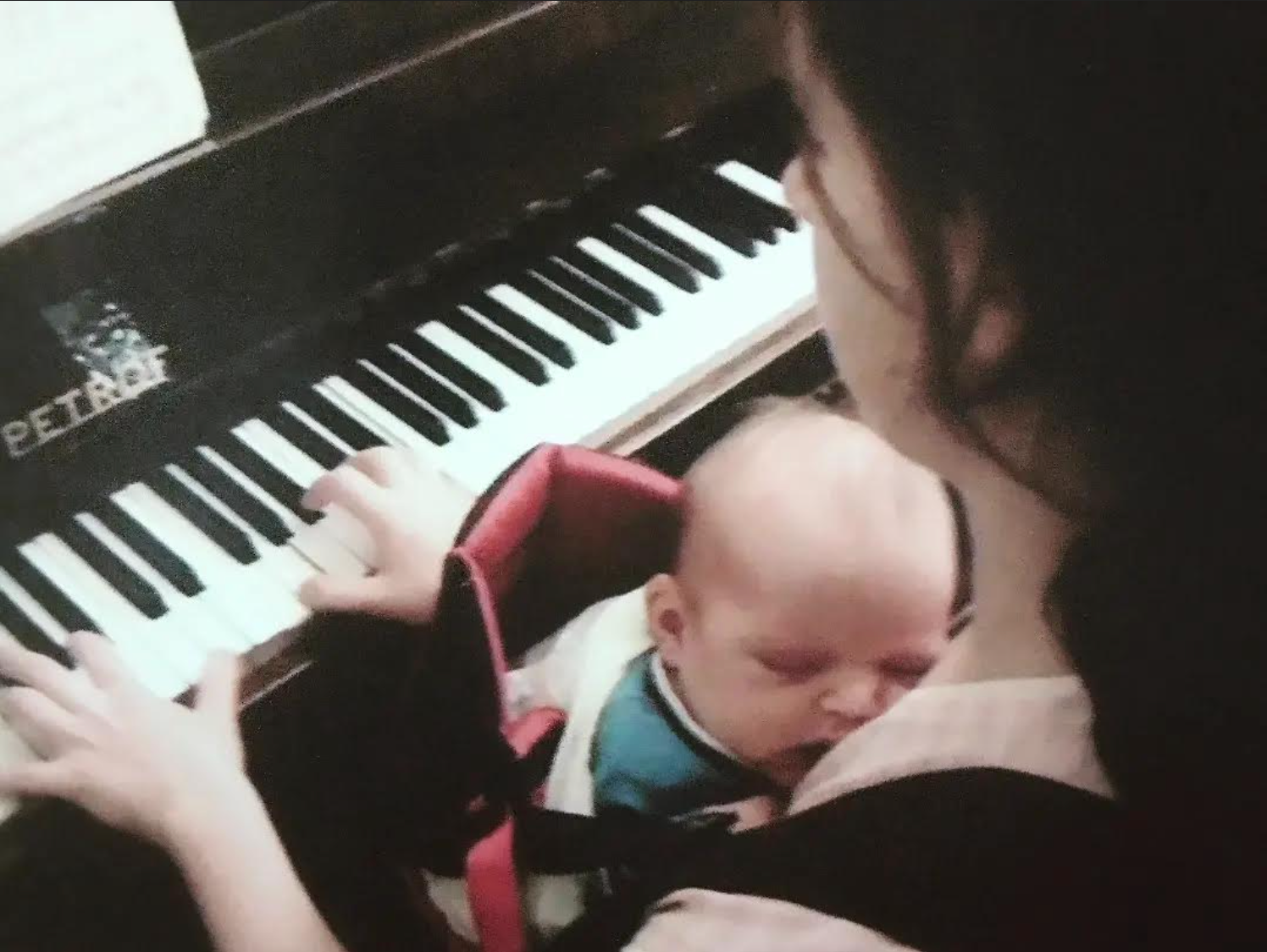Eva Popov (Hello Satellites): “Let your songs take care of you”
Hello Satellites is the moniker for singer, songwriter, multi-instrumentalist and producer Eva Popov.
Headed by Eva’s distinctive songwriting and ethereal voice, Hello Satellites has undergone various incarnations across a decade of live shows and albums: from full-band adventures in joyous experimental pop, to quiet incantations of neo-classical narrative folk.
She resides in the inner-north of Naarm/Melbourne with her partner Cam Venn, a comedian & theatre-maker, and their two daughters aged 10 and 15.
Hello, Eva! Thank you for speaking to Mother Lode.
One of the things I love about Hello Satellites (as well as the earlier releases under your own name) is there’s this beautiful, homespun authenticity to the feeling and the sound in the songs. Would you say you have a DIY/punk approach to music-making?
Having a space to record at home really revolutionised music-making for me! I began to see songwriting as just one part in the process... and then finding and collaging and sculpting the right sound to support those songs, a really long and painstaking process. I devoted years to finding each album's personality. This was supported by producers Nick Huggins (self-titled; There Is a Field; 84000; Bright Face) and Joe Hammond (84000)… but having the files to work with at home meant I could be really involved with shaping the sound.
Recording at home also offered the luxury of time – something which isn't possible in a studio-based approach, where I would be paying to hire a room and work with others. At home, I could re-record things as many times as I liked, or try as many stupid ideas as I wanted (as a rule, what you hear on an album is only 5% of what I experimented with at home). Having the time to make errors was really important to me. Being able to take creative risks. Creating a joyful space of sonic experimentation.
Photo by Camille Perry
Your latest album There Is A Field marks a significant development in your sound, in the way you embraced a more electronic palette. Can you tell us a bit about how that came to be?
The songs were all written as acoustic folk songs. I had been working and mothering in Naarm/Melbourne for a long time, feeling like I was in the wrong place – living in a phone-addicted daze, and dreaming that one day I would find my true home in a field by the ocean... and there I would be healed, and redeemed, and finally be a whole person.
Across this time I was also working at Arts Centre Melbourne, running workshops in music production for teenagers and young people. Kids would come in, and in just over an hour they’d create these electronic “dance bangers” out of loops. The freedom and fun of this was infectious, and I wanted to approach music with that childlike and experimental approach of not caring if anything was good, or bad, but just doing it to make something!
In 2018, I did the Operator course at Arts Centre Melbourne [professional development for female-identifying electronic music producers], and it was so liberating. I found that Ableton is an incredible sonic playground for songwriting. I also discovered the beauty of 5D MIDI – a world of synthesised sound that felt more tactile; more nuanced in pitch and dynamics.
I've always loved pairing acoustic and synthesised sound – finding the blurred lines between the “real” and “un-real” (nothing is real in the digital realm; even if your'e recording an acoustic instrument, it’s all translated into digital sound).
Actively pursuing this palette of sound for There Is A Field meant I could work independently at home – and as I don't have a “real” studio in my house with acoustic isolation, the physicality of MIDI worked well. I had intended to re-record a lot of the MIDI parts acoustically, but album producer Nick Huggins encouraged me to leave it as is.
Tell us a bit about your mothering journey. Where were you in your career when you became a parent?
I was working on my album Me, the Sea and Stars – a folk collection of songs about death and mortality. I was juggling this with finishing my Creative Arts degree and living in a share-house. I unexpectedly fell pregnant, and it felt absolutely right and life-affirming that a pregnancy should be part of the story of that album. I was very young, terrified and unprepared – but also felt really excited and blessed, because so much of my life had been heavy with grief to that point. My daughter brought with her a lightness, a wave of joy – and she still makes me laugh every day.
Eva songwriting at the piano with her infant daughter.
How did you imagine motherhood would affect your music career? How accurate was that?
Clare Bowditch mentored me across the release of my first EP, and my sister worked in theatre whilst raising 3 daughters, so I never questioned whether I would keep working when I had kids – it just seemed like the normal thing to do.
But I didn't expect how attached I would be to my children, or how much anxiety I would have about not being there for them, which was carried over from my own childhood. So I was really frustrated at my own limitations. But I still managed to release all my albums post-children, and tour. I look back now and absolutely wish I had taken more space. I worked really hard on my albums – through pregnancy and my daughters’ babyhoods, and toddler years. By the time my fourth album Bright Face came out, I was emotionally burnt out.
What surprising or unexpected ways did becoming a mother benefit your creative practice or career?
Being creative felt much easier after I became a mum. It was as if the act of saying “yes” to a new life could carry over to the act of saying “yes" to songs, and being in touch with creative energy in a way that felt really ecstatic and open.
Becoming a mother also streamlined my musical interests. I had grown up on classical piano, jazz guitar, and before I fell pregnant I had been studying Indian classical vocals. Having a baby pushed me keep it simple and consolidate my style – which became pop and folk music. They have heart without the need for the virtuosity.
What about your Bulgarian heritage – how has that influenced and shaped your mothering, and your creative practice?
As the first Bulgarian in my family to be born away from her homeland, I’ve always had this obsessive need to belong. The feeling of being an alien is just the backdrop to my life. Finding a sense of home, or a resting place, or a connection to land has been the main driver of my songwriting practice.
In Bulgarian culture, women are expected to be very hard working – domestically, as educated women, and as workers. Growing up I had a real sense of needing to be a high achiever, and this was a very difficult thing to carry into music as a mother.
I held the impossibility of being the mother I wanted to be (totally present for my daughters)... the artist I wanted to be (honest, fierce, hardworking, creator of beautiful things)... and the income earner I wanted to be. I stayed on this crucible of impossibility for a long, long time, drawn in by the adrenaline rollercoaster of making work, and a deep need to resolve all that was hurting inside me through songs and art.
My father is a priest; that's why my family came here. And in the Orthodox church, all prayers are sung. Before dinner, before bed, every Sunday. Singing was simply an everyday way of communicating with that which we cannot see; a way of hoping, grieving, wishing. Eventually I created my own way of praying and communicating with the world, and songwriting has been my way of doing that. It’s how I of make sense of, and talk to, the world. It’s how I trying to mend that which feels broken, and preserve that which I love.
“Prayer” is a tricky word in a secular society. But because singing had such a practical application for me growing up in the church, there was something quite matter-of-fact about applying my voice to songwriting. It was less about performance or entertainment, and more about having a conversation with the world.
Songwriting has helped guide me to a place of belonging and connection, in a country and culture where I'd always felt like a bit of an alien.
Photo by Camille Perry
What does “having a successful career” in the music industry look like to you?
Being in integrity. Being of service. Feeling like I am myself. Feeling like my work is helpful to others. Having the income to have a life where I can support my family without financial stress. Embodying a sense of wonder, creativity and fulfilment. Having adventures, and a deep connection to others.
You’re a parent to two girls, aged 10 and 15. What “Big Sister Advice” would you give other musician-mums with teenage or young adult children? What are the joys or the challenges of this phase of parenting?
The joy of this time is that there is more space and time to do things I enjoy and take care of myself – so the exhaustion is not so intense for me now. The challenge is, I feel a lot more critiqued by my children, and want to protect them from the emotional spillover of my songs which can be very vulnerable and personal. My kids' criticism of me also brings a little more self-criticism to the creative process, making me more cautious as an artist than I was earlier.
I have no advice [laughs]. I will say that I am enjoying having space from “needing” to be a musician, and have discovered that that space gives me more time to exercise, kayak, live in a more grounded way, as well as earn an income.
What about the “Big Sister Advice” would you give your younger musician-mama self? If you could travel back in time to when your children were smaller, what would you say to yourself as a mother?
I would say: your health is the most important thing. Don’t buy into the urgency of anti-aging culture. You are the source of support to your children (and your self), but you need to be well in order to do that. Let your songs take care of you, rather than sacrificing your wellbeing and energy to have them validated by the wider world. Your songs are sacred just for their own existence, not because of the applause that they receive. A human is valid even if they feel unseen by wider society.
Mothers are so, so important... and so under-resourced. And we are often hurting because of this lack of support. So we must care for ourselves and each other – and appreciate the magnitude of what we do, because we live in a culture that will not recognise it for us.
I’d also remind myself to enjoy the playfulness of the moment, and the absolute gift of having a band and the privilege of making music! Hold it lightly, but appreciate it enormously.
Hello Satellites is performing at New Hall Point Lonsdale on Friday 4 March, in support of Open Swimmer’s album launch. Event details HERE.
Eva will also be in conversation with Mother Lode founder Georgia Fields and ARIA-nominated pianist/composer Nat Bartsch on Monday 7 March for RETHINKING THE MUSIC CITY, presented by La Mama Musica. Tickets to attend La Mama Theatre in-person are HERE. Tickets for the live-stream are HERE.




